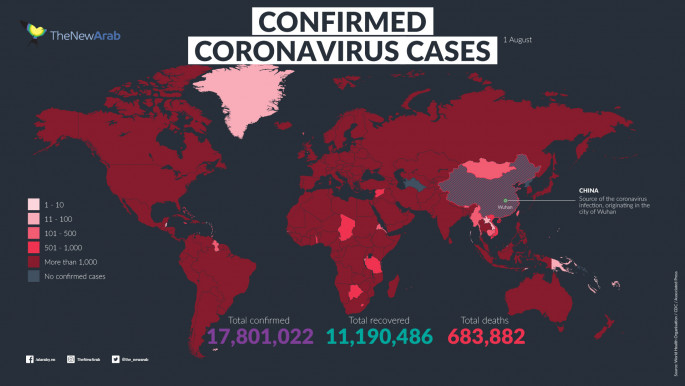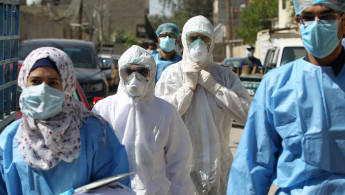Follow us on Facebook, Twitter and Instagram to stay connected
Coronavirus cases in Iraq 'thousands more' than reported by government, say doctors
Three doctors have revealed that they believe coronavirus cases in Iraq are much higher than the government has reported, and fear the virus could spread.
2 min read
Doctors insists cases are much higher than officially reported [Getty]
Iraq has thousand of confirmed cases of the novel coronavirus, many times more than the 772 it has publicly reported, according to three doctors closely involved in the testing process, as well as a health ministry official and a senior political official.
This could spell disaster for the country and its depleted healthcare system.
Iraqi authorities have instructed medical staff not to speak to the media, and the sources have spoken to Reuters on the condition of anonymity.
The three doctors, who work in pharmaceutical teams testing Covid-19 cases in Baghdad, each said that the confirmed cases of the disease, based on conversations they’ve had with medical staff who see daily results, were between 3,000 and 9,000.
The health ministry official, who also works in testing for Covid-19, the disease caused by the new coronavirus, said that there were more than 2,000 confirmed cases from eastern Baghdad alone, not counting the number in other areas or provinces.
The political official, who has attended meetings with the health ministry, also said thousands of cases were confirmed.
However Iraq’s health ministry insists that the numbers are far lower.
“It’s incorrect information,” said Saif al-Badr, the health ministry spokesman, and ministry figures put the number of cases in Iraq at 772, with 54 deaths.
The novel coronavirus hit neighbouring Iran worse than any other country in the Middle East, and in response Iraq shut its border in February over fears that the infection could spread.
Keeping numbers down
The three Iraqi doctors and the political official said national security officials had attended health ministry meetings and had instructed authorities not to reveal high figures as it could create public disorder and a rush for medical supplies.
One of the doctors said the death toll was also likely higher than the official toll, but not by much.
“On Saturday last week alone, about 50 people were buried who died from the disease,” he said.
At that time the official death toll was 42.
Testing facilities in Iraq are severely limited, and Iraq authorities have acknowledged that the number of cases may be higher than the confirmed number of cases.
Medical professionals blame the spread of the virus on a number reasons including people refusing to be tested, flouting the nationwide curfew and pilgrims who travelled to a Shia Muslim shrine in Baghdad last month.

This could spell disaster for the country and its depleted healthcare system.
Iraqi authorities have instructed medical staff not to speak to the media, and the sources have spoken to Reuters on the condition of anonymity.
The three doctors, who work in pharmaceutical teams testing Covid-19 cases in Baghdad, each said that the confirmed cases of the disease, based on conversations they’ve had with medical staff who see daily results, were between 3,000 and 9,000.
The health ministry official, who also works in testing for Covid-19, the disease caused by the new coronavirus, said that there were more than 2,000 confirmed cases from eastern Baghdad alone, not counting the number in other areas or provinces.
The political official, who has attended meetings with the health ministry, also said thousands of cases were confirmed.
However Iraq’s health ministry insists that the numbers are far lower.
“It’s incorrect information,” said Saif al-Badr, the health ministry spokesman, and ministry figures put the number of cases in Iraq at 772, with 54 deaths.
|
The novel coronavirus hit neighbouring Iran worse than any other country in the Middle East, and in response Iraq shut its border in February over fears that the infection could spread.
Keeping numbers down
The three Iraqi doctors and the political official said national security officials had attended health ministry meetings and had instructed authorities not to reveal high figures as it could create public disorder and a rush for medical supplies.
One of the doctors said the death toll was also likely higher than the official toll, but not by much.
“On Saturday last week alone, about 50 people were buried who died from the disease,” he said.
At that time the official death toll was 42.
Testing facilities in Iraq are severely limited, and Iraq authorities have acknowledged that the number of cases may be higher than the confirmed number of cases.
Medical professionals blame the spread of the virus on a number reasons including people refusing to be tested, flouting the nationwide curfew and pilgrims who travelled to a Shia Muslim shrine in Baghdad last month.

Agencies contributed to this report.





 Follow the Middle East's top stories in English at The New Arab on Google News
Follow the Middle East's top stories in English at The New Arab on Google News
![The UAE is widely suspected of arming the RSF militia [Getty]](/sites/default/files/styles/image_330x185/public/2024-11/GettyImages-472529908.jpg?h=69f2b9d0&itok=Yauw3YTG)
![Netanyahu furiously denounced the ICC [Getty]](/sites/default/files/styles/image_330x185/public/2024-11/GettyImages-2169352575.jpg?h=199d8c1f&itok=-vRiruf5)
![Both Hamas and the Palestinian Authority welcomed the ICC arrest warrants [Getty]](/sites/default/files/styles/image_330x185/public/2024-11/GettyImages-2178351173.jpg?h=199d8c1f&itok=TV858iVg)